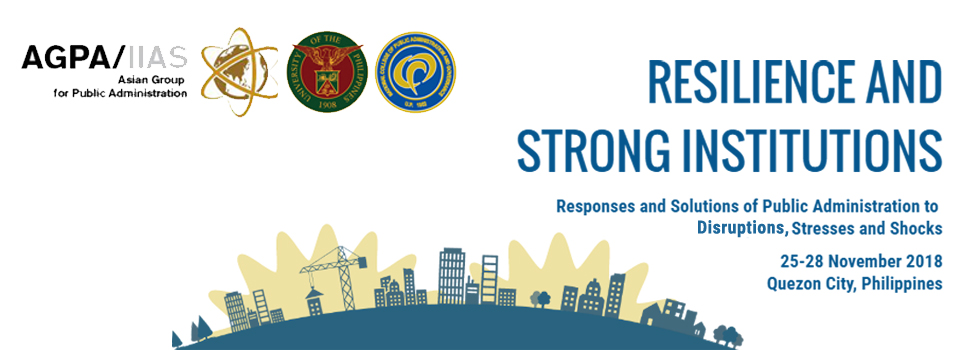The 2018 Annual Conference of the Asian Group for Public Administration (AGPA) will be jointly organized by AGPA and the University of thePhilippines National College of Public Administration and Governance (UP NCPAG) in Quezon City, the Philippines on November 25-28, 2018.
AGPA is a regional group affiliated to the International Institute of Administrative Sciences (IIAS), a global organization based in Brussels and established in 1930. It is aimed to build a platform in Asia and promote the development of theoretical research and practical innovation in public administration (PA) in the area. The UP NCPAG is one of the centers of excellence in PA education, research and extension in Asia.
The AGPA organizing committee cordially invites scholars and practitioners in the field of public administration to take part in the conference and submit papers for presentation.
Theme: Resilience and Strong Institutions: Responses and Solutions of Public Administration to Disruptions, Stresses and Shocks
Since the turn of the 21 st century, the concept of resilience has steadily shifted the language of debate and influenced how organizations pursue their mandates. Bilateral and multilateral financing organizations, as well as supranational organizations, State, sub-State and non- State actors, have appropriated the term in their policies, development planning, and work programming, leading the UK’s Institute of Development Studies to point to a “resilience renaissance,” albeit in a limited context. The adoption of the Sustainable Development Agenda 2030, Paris Agreement, Sendai Framework for Disaster Risk Reduction, and the New Urban Agenda from 2015 onward formally ushered in resilience, both as a goal and guiding principle, in ongoing discourses on and practice of development.
The concept of resilience itself is not entirely new and certainly not exclusive to a specific epistemic community. At least for academia, its evolution has followed different disciplinary trajectories from ecosystem stability to engineering infrastructure to psychology to the behavioural sciences, to name a few. Within public administration, the New Public Governance underlines the value of building resilience through collaboration, participation, and learning. The notions of “resilient organizations” in general and “administrative resilience” in particular have been examined in the various contexts of ambiguities, stresses and shocks that may be political, economic, social, natural, technological or financial in origin. Regardless of discipline, the concept springs from a fundamental common characteristic, that is, the ability of a system to anticipate, absorb, mitigate, and bounce back/build back better from
disruptive events.
In line with the theme of the 2018 Congress of the International Institute of Administrative Sciences (IIAS), the AGPA 2018 Annual Conference invites researchers, scholars and practitioners to share their researches on resilience in public administration and governance. With the theme, “Resilience and Strong Institutions: Responses and Solutions of Public Administration to Disruptions, Stresses and Shocks”, the international conference will have
the following sub-themes:
Sub-theme 1: Political and Administrative Resilience
Resilience as public administration value in an era of change and complexity; Disruptions, adversities and “lock-in” affecting governance system, public service delivery and performance (e.g.,natural disasters; political events leading to political dictatorship, populism, cultural exclusion, social marginalization;changes in government policies; socio-demographic shifts; pandemic; new technologies; other shocks); Redefining public sector reforms, ethos, norms and standards; Shapes and directions of future political and administrative resilience; governance and anti-corruption; populism, neo-liberalism and polarized societies; quality, integrity and resilience; shifts and turns in the political and administrative arena and what we can do better.
Sub-theme 2: Risks, Crisis and Disaster Management
Managing and delivering public services in turbulent times; role of science, law and governance in risk, conflict and crisis management; challenges and imperatives of disaster management; approaches and new trajectories in urban and rural, financial and ecosystem resilience; emerging governance models to deal with disturbances and adversities.
Sub-theme 3: Sustainable Development Goals and Strong Institutions
SDGs, green governance, best practices and ways forward; population, ageing, health and social welfare; localizing SDGs; partnerships, strong institutions; research and innovation; competition, cooperation and regulation; Social enterprises, social protection and uplifting the lives of the marginalized; inclusive governance and leaving no one behind; challenges and prospects in promoting social equity, fairness and empowerment.
Key Requirements:
1.Abstracts with 250-400 words (along with a brief biosketch) should be submitted to agpaconfab2018@gmail.com;
2.Paper presenters should submit papers that are relevant to the conference theme and streams;
3.All papers should be written and presented in English.
4. Paper presenters notified by the Organizing Committee to submit their full paper and PowerPoint presentations should do so on or before the deadlines.
5.The paper should be from 6,000 to 8,000 words long, inclusive of notes and references, and should be typed double-spaced on A4-sized paper using the Times New Roman font, sized 12 pt.
6. Papers should also include a title page with the following information: title of paper, subtheme, institution or agency, country and contact information, as well as logistical support needed (e.g. additional computer unit, laser pointer,etc.)
7.Dates to Remember:
Abstract: On or before August 15, 2018; paper presenters will be notified whether their respective paper is selected or not by August 31, 2018. Submission of Full Paper and Powerpoint Presentation: On or before October 15, 2018.
8. Conference Fee: $200 orP8,000 inclusive of conference materials and meals during the conference and learning visit. Participants are responsible for funding and arranging their travel and accommodation plans. Note: All submissions should be made to the AGPA organizing committee via e-mail (agpaconfab2018@gmail.com).
Download Call for Papers here.

